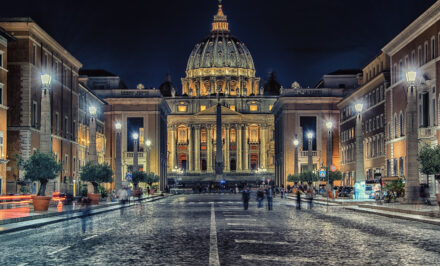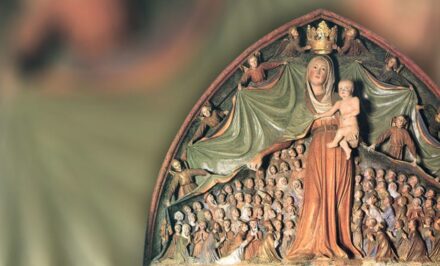 José María Sanguinetti. How would one define a new style of life that could answer the crisis that man is going through in our time? The “organic doctrine” was an authentic crusade for Joseph Kentenich, an integrated response to the crisis that already confronted man in the beginnings of the 20th century, but as Fr. Kentenich himself points out, will affect humanity for a long time. For this reason, to live organically” (which includes to think and to love) continues everyday to be the concrete and more valid answer for us all.
José María Sanguinetti. How would one define a new style of life that could answer the crisis that man is going through in our time? The “organic doctrine” was an authentic crusade for Joseph Kentenich, an integrated response to the crisis that already confronted man in the beginnings of the 20th century, but as Fr. Kentenich himself points out, will affect humanity for a long time. For this reason, to live organically” (which includes to think and to love) continues everyday to be the concrete and more valid answer for us all.
 We are what we have
We are what we have
We lived immersed in a disorder among the different dimensions of relationships: we apply in things the importance of interpersonal links, we convert persons to material things, we animalize persons , we personalize animals, and we refuse all proposals that lead to transcendental things, to things beyond, to the Divine. We have reduced our culture to mean, that “we are what we have” or “we are what we eat” and it has reach the point, thanks to capitalism and economic theories, wellness is measured in parameters of consumption, of access to goods and economic capital.
For several decades now, economists have noticed that the relation between income and access to goods and services are not proportional to wellness nor to happiness; countries with higher GNP are not necessarily those with a better perception of happiness or personal fulfillment in its inhabitants; it seemed there was always that “something” missing which escapes all means of measurement, but do is not found in the equation.
What other possible factors are there to fill up these vacancies which “strong” economic parameters fail to measure : birthrate, the number of marriages celebrated, divorce rate, the average number of working hours, distance from home to work, money allocated for our “defense,” (expenses for security: insurance, private police, alarms, bulletproofshields, etc.) the amount of time for sports?
The influence of these economic theories are so strong that countries with high birthrates are considered “undeveloped” (at least this was the case for a good stretch of time now) and policies of economic support towards the Third World included birth control planning in exchange of support. Today many developed societies have an aging population, with very low birth rates and are suffering the consequences in their pre-visional aspect and the labor market.
If “to be is to have” then to be is to generate more resources to acquire more, without considering the time that one needs to obtain those goals nor the deterioration in unity, in health (physical and mental) and in the “quality of life.”
What currents of life move persons today?
Today´s huge confusion is not a simple consequence of the struggle between capitalism and communism which has been going on for nearly a century. There is a mentality, a vision of man and society that has triumphed and has gone over the economic theories and ideologies, everything is measured according to its efficiency, its usefulness, and its being obtained instantly.
Reading quickly, we can get the impression that the triumph of capitalism has been overwhelming but looking closely, we detect numerous elements proper to marxism (including some traits of fascism) in several democratic states and in many capitalist’s regimes. What kind of current thoughts move the people today? An inconsequential materialism (consumption and hedonism) and an atheism with different expressions (pantheism and seekers of “power”)
Does happiness have a “price”?
Where do we start? Should we lower our expectations? Our material ambitions? Neither yes nor no: it is necessary that we reorganize our “organization of relationships”, not to put expectations in places that correspond to another, nor compensate our failure in personal relationships with the acquisition of material goods nor convert persons into things; nor equate a pet to “a child”, nor acquire technology wantonly just because “to be is to have”.
It does not imply lowering expectations but to choose those which allow one to develop (in the most harmonious way possible) all levels of necessary links to be happy: How much time should I not spend with my children to earn more money? How many hours of sleep do I need? How much time should I be at home to have enough dialogue in my marriage so we could enjoy being together? Does happiness have its “price”?
We do not want to go to the other extreme of negating the need of maintenance and progressive material that all persons need for their normal development, but we do not want to blind ourselves either with the dominating material glare which, founded on relativism, only looks for usefulness in its relationships, thus generating a deep emptiness that is filled with compensations (consumption, alcohol, drugs, etc.)
The restlessness for a more fulfilled life
Throughout history, there had always been this restlessness for a more fulfilled life, more balanced, that allowed one to find happiness; many personalities have opposed, showing other forms of life against the current ones of their times like St. Francis of Assisi or Gandhi for example.
Multiple answers have surged out throughout the 20th century and in the beginnings of the 21st to try to generate a vital countercurrent. To counteract the unbridled dizziness of huge cities, the “slow culture” was proponed decades ago by some; to the excessive consumption of goods, the “freegans” consume only discarded food.
There are two other more global indices that show the need of fulfillment of people, much beyond just that of consumption: the ecological movements (they started with the animal and plant ecology but turned to social ecology) which incorporated in the Business culture, concepts like the “ecological impact or that of the “Social Responsibility”. Another phenomenon is the rampant voluntary work taken up by many in all types of NGOs. In these counter currents, there is a need to “have less to be” or “give to be” although this giving doesn’t only come in the sense of giving materially but also giving of “ourselves” (donate part of our time, of our work) to be happy.
A new society
These are good initiatives but evidently they do not achieve developing a “new society.” We should try to reach much more, overcoming just the spirit of philanthropy, by reaching that sphere wherein solidarity is replaced by fraternity. Can this be the answer? Some so believe, and they continue along this line, but with the (necessary) precept that the search should start from a “new man”, with new ethics, based on fraternity, responsible, free and with the spirit of family in the organizations.
Although we can read in these lines, some of the ideas of the French Revolution, these concepts of fraternity and Christian liberty are far from what the flags of the 18th Century meant. Why? The spirit of family (some use the image of the Trinity to explain this) gives a reference of an authority that orders and guides all effort; from this perspective liberty and fraternity are understood.
We affirm that a “new society” is not possible without the formation of “new persons,” and this is again impossible, without the indispensable collaboration of “new families”. The utopia present in Occidental history (from the Republic of Plato to Marx, going through Thomas More) had always expressed the need of a new type of person (the iconographic Che Guevara talked of the “New Man”, just as the National Socialism did), but the formation of these new persons did not always rest in the family as the essential nucleus for the change. We should add that for many, the formation of this “new man” should (and is) be outside the family; in many cases they wanted the State to assume this role.
The 20th Century with its wars, economic crises, and economic development, brought the world (contrary to what many think) to profound inequalities, to a deep abyss within many societies, to death due to malnutrition and epidemics of obesity, to starvation and the boredom of people (in many cases, we can observe both phenomenon in the same country). This century as well, offered many vital countercurrents that tried to give man a new meaning (always new and always old) in the light of Christian values.
In the shadow of World Wars
In the shadow of the Second World War, a light surged forth from Chiara Lubich and for seventy years now, the Focolares strive to incarnate the model of fraternity and unity with definite aspects (like the development of the Economy of Communion). A hundred years ago with the threat of the First World War in Europe, Joseph Kentenich proposed a “Program” to a group of seminarians to later found Schoenstatt, encouraged by the forming of “New Men” in a “New Community” radiating strongly the world of education and formed numerous religious communities offering a “Covenant culture”.
These initiatives (together with some in different areas) differ from those proposals that stay on the surface, those that do give answers but do not go to the roots of the problem, those that do not insist on a change of mentality, a “new man” to form a “New Social Order”. One hundred years after, the children of those founders have the challenge to live a new style of “organic life”, reorganizing the world of relationships, that would allow one to lead life to “be” and not “to have”, to “give” and not “to own”. A more austere life, more simple, more free, and at the same time more responsible for his neighbor, knowing that our fates are fraternally inseparable.
A new style of life – the Culture of Alliance
Utopias, as I said earlier, have always accompanied the history of humanity. The majority of persons would reason that the last great utopia of humanity disappeared with the fall of the Iron Curtain more than twenty years ago now. From then on, it seems that humanity has settled to just reaching a certain “wellness” and “comfort” without thinking of more profound changes. However, a certain utopia is ever present, visible and valid that was proclaimed by Christ more than two thousand years ago. This utopia will soon take place, there is a Kingdom that will come and fulfill this ideal. In the meantime, several carriers of this Utopia exist which have achieved that this “Kingdom come” to us showing the brilliance of that Heaven.
It is time that we proclaim with more vigor, our style of life, that “organic life” where we admit that this “new society” needs renewed families who will be school for the “new men”, vital areas where one can live the ideal proposed (always old and always new) by Christ more than two thousand years ago.
“We only know that we should be sentinels in the towers of time.”
Father Joseph Kentenich
English translation: Kohnie Valderrama, Madrid, Spain













